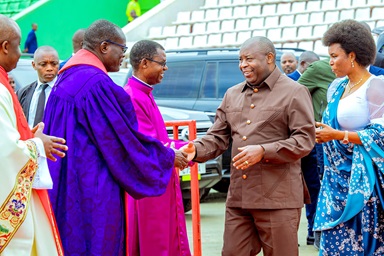A bicycle was the only way they had to travel from one United Methodist congregation to another in 1977, recalled two pastors who found much to celebrate at the Ebenezer Convention, the largest United Methodist Church convention ever held in Zimbabwe.
The Rev. Kelvin Mwandira and the Rev. Jairos Mafondokoto, graduates of the United Theological College in Harare, said the Ebenezer Convention itself shows the denomination has reached new heights in Zimbabwe. More than 55,000 United Methodists from around the world attended the Saturday afternoon session of the convention held Aug. 15-17 at the National Sports Stadium.
When he started out, pastors in Zimbabwe got a bicycle when they graduated from college, Mafondokoto said.
“The annual conference gave each pastor a bicycle and we had to pay for it in installments. Years later, we were given motorbikes, which we also had to pay for,” he said.
His first appointment was at Zimunya Circuit and was comprised of 12 stations – now referred to as local churches.
“The furthest distance I travelled on that bicycle was from Munyarari to Rimiti and Himalaya stations, about 28 kilometers (17.36 miles). At times I walked or used buses depending on my mission,” Mafondokoto said.
It was impossible to visit two congregations in a week. “I would leave home on Tuesday in order to start my visitations on Wednesday. Thursdays were a day for home visits and station administration duties, while Fridays were reserved for the women’s union, Rukwadzano Rwe Wadzimai, and meetings.”
Sunday was for preaching and meeting with church committees. He rested on Monday before setting out for the next station. This routine usually meant Mafondokoto spent three weeks away from his family, relying on the goodwill of the congregation to provide accommodations.
Pastor lived in two classrooms
Mwandira faced many challenges during his early years in Bulawayo.
“I was one of the first pastors of Bulawayo West Circuit and when I arrived with my family, we discovered there was no parsonage,” Mwandira recalled.
He was offered two classrooms where he lived for a year. Then the church leased a four-room house with an outdoor toilet for him.
Mwandira said the congregation he served at the time included some members who lived in the city’s affluent suburbs, but said they were not disturbed by his living and working conditions.
“The congregation accepted the way we lived and worked. They thought we were better than our predecessors who walked since they had no bicycles, and ate a diet that included blackjack weeds (nhungumira).” Blackjack weeds are a common vegetable in Africa.
Mafondokoto said the level of giving in the church has greatly increased, resulting in better conditions for pastors.
“I remember a time when we were not paid salaries. Quarterly conferences were convened every three months where the 12 stations under my charge would gather and contribute finances to a common pool. The budget was written on a blackboard and the first item on the list was my tuso (compensation).”
The top priority expense was food for the conference delegates. The food included bread, ingredients for making tea, and a goat to slaughter for the main meal of the day, Mafondokoto said.
“Silver coins were used to purchase food while the remainder of the collection, usually pennies, were tied up in a handkerchief and handed to me as tuso. We have witnessed tremendous growth and pastors today have fixed salaries and fixed paydays. Circuits have good accommodation and new motor vehicles for pastors to use,” Mafondokoto said.
Ebenezer Convention was milestone for church
Mwandira recalled going five months without pay.
“I stayed five months without a circuit during the country’s liberation war when some churches were closed, and therefore had no income until my appointment to Bulawayo West on March 9, 1979.”
Mwandira says challenges But he welcomed those challenges, which he said made him prayerful.
“I worked as a pastor for 27 years before I was appointed district superintendent, which was another level of ministry for me,” he said.
Mwandira said the Ebenezer Convention was a milestone. “We are opening a new page for the church’s ministry. Ebenezer Convention is not the conclusion of the story,” he said.
Mafondokoto said the convention held great meaning for him. “To be able to meet in the country’s biggest stadium is a far cry from the bush camping we used to do where the hosting circuit spent two weeks building grass shelters for use during conventions.”
“I have travelled far and so has the church.”
Chikwanah is a communicator of the Zimbabwe East Annual Conference.
News media contact: Vicki Brown, news editor, [email protected] or 615-742-5469.
Like what you're reading? Support the ministry of UM News! Your support ensures the latest denominational news, dynamic stories and informative articles will continue to connect our global community. Make a tax-deductible donation at ResourceUMC.org/GiveUMCom.






